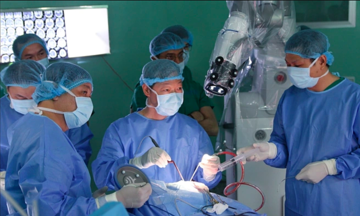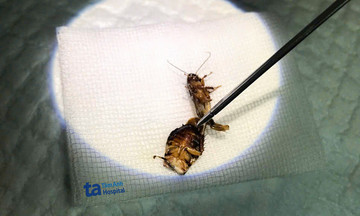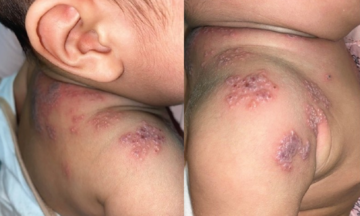The teenager developed a fever and cough a few days before school started. His mother, thinking it was a common cold, gave him over-the-counter medication so he could return to school on time. After 9 days with no improvement, he was admitted to Gia Dinh People's Hospital and diagnosed with acute pneumonia. His health is now stable, and he is expected to be discharged in the next few days.
"I didn't expect it to become pneumonia. It breaks my heart to see him in the hospital, especially during the first day of school. He keeps asking when he can be discharged to go back to class," his mother said.
 |
The doctor examines the teenager. Photo: Minh Toan |
The doctor examines the teenager. Photo: Minh Toan
Respiratory illnesses are not the only culprits; many students have also missed school due to digestive problems. A 7-year-old second-grader from Go Vap District, Ho Chi Minh City, was also hospitalized just before the new school year began. In the morning, her grandmother bought her a box of savory sticky rice. The girl didn't finish it, so her grandmother gave her the leftovers in the afternoon. About an hour later, the girl experienced severe stomach pain and vomiting, requiring emergency hospitalization that night. She was diagnosed with a digestive disorder.
Her grandmother explained that the girl loves sticky rice, and she thought it would be fine to save the leftovers. She didn't expect it would cause her granddaughter to miss school. "She keeps sadly asking when she can see her friends again," the grandmother shared.
According to Doctor Pham Thi Hoang Oanh, Deputy Head of the Pediatrics Department at Gia Dinh People's Hospital, back-to-school season is a time when children are susceptible to various illnesses due to changes in their routines and increased exposure to others. Common illnesses include respiratory infections (the flu, sore throat, bronchitis, pneumonia), airborne diseases (measles, mumps, chickenpox), and foodborne or contact-transmitted illnesses (hand, foot, and mouth disease, digestive disorders, and diarrhea).
"In addition to weather-related illnesses, we've seen many cases of digestive disorders in children," the doctor said. Children may experience vomiting or acute diarrhea due to viruses or gastrointestinal infections. If not treated promptly, these can lead to food poisoning or outbreaks.
To protect students' health, parents should ensure their children are fully vaccinated. They should instill habits of handwashing before meals and after using the restroom. Parents should also choose safe foods and avoid serving leftovers that have been sitting out for too long. Providing a balanced diet rich in vegetables, fruits, and plenty of water is essential.
If a child exhibits symptoms such as high fever, rash, vomiting, severe diarrhea, or stomach pain, they should be taken to a medical facility immediately. Close collaboration between families, schools, and school health personnel is also crucial for early detection, isolation, and prompt treatment, preventing potential outbreaks.
Le Phuong












